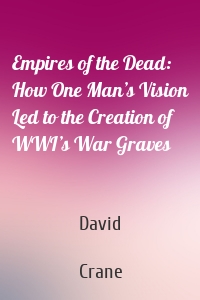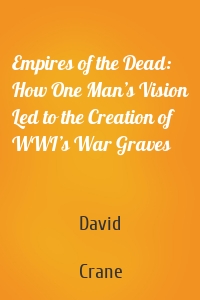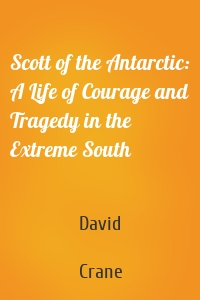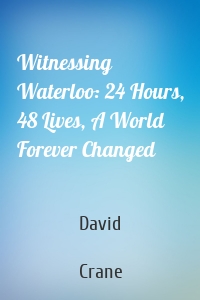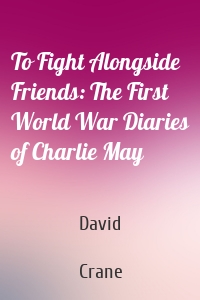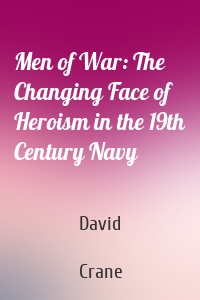David Crane
8 кн.
Empires of the Dead: How One Man’s...
Before WWI, little provision was made for the burial of the war dead. Soldiers were often unceremoniously dumped in a mass grave; officers shipped home to be buried in local cemeteries.The great cemeteries of WWI came about as a result of the efforts of one inspired visionary. In 1914, Fabian Ware, at 45, was too old to enlist. Instead, he joined the Red Cross, working on the frontline in France. There he was horrified by the ignominious end to the lives of many of the soldiers who, buried...
| Автор | David Crane |
Empires of the Dead: How One Man’s...
Before WWI, little provision was made for the burial of the war dead. Soldiers were often unceremoniously dumped in a mass grave; officers shipped home to be buried in local cemeteries.The great cemeteries of WWI came about as a result of the efforts of one inspired visionary. In 1914, Fabian Ware, at 45, was too old to enlist. Instead, he joined the Red Cross, working on the frontline in France. There he was horrified by the ignominious end to the lives of many of the soldiers who, buried...
| Автор | David Crane |
Lord Byron’s Jackal: A Life of Trel...
‘There is a mad chap come here – whose name is Trelawny… He comes on the friend of Shelley, great, glowing, and rich in romance… But tell me who is this odd fish? They talk of him here as a camelion who went mad on reading Lord Byron’s ‘Corsair’.’ JOSEPH SEVERNDavid Crane’s brilliant first book investigates the life and phenomenon of Edward John Trelawny – writer, adventurer, romantic and friend to Shelley and Byron. Very reminiscent of YoungHusband in its mix of biography, history and travel...
| Автор | David Crane |
Scott of the Antarctic: A Life of C...
David Crane has given us the definitive biography of one of Britain’s greatest heroes and explorers.‘It seems a pity, but I do not think I can write more…For God’s sake look after our people.’These were the final words written in Scott’s diary on 29 March 1912, as he lay dying in his tent with Birdie Bowers and Edward Wilson. Oates had taken himself into a blizzard a few days before, and the fifth member of the Polar party, Edgar Evans, had died some ten days previously, worn out by the cold and...
| Автор | David Crane |
Witnessing Waterloo: 24 Hours, 48 L...
[Previously published as ‘Went The Day Well’]A sweeping political, social, military and cultural overview of the United Kingdom on the eve, and then the day, of the greatest battle fought by British arms.Midnight, Sunday, 17 June 1815. There was no town in England that had not sent its soldiers, hardly a household that was not holding its breath, not a family, as Byron put it, that would escape ‘havoc’s tender mercies’ at Waterloo, and yet at the same time life inevitably went on as normal.As...
| Автор | David Crane |
To Fight Alongside Friends: The Fir...
‘I do not want to die. The thought that we may be cut off from each other is so terrible and that our babe may grow up without my knowing her and without her knowing me. It is difficult to face. Know through all your life that I loved you and baby with all my heart and soul, that you two sweet things were just all the world to me’Captain Charlie May was killed, aged 27, in the early morning of 1st July 1916, leading the men of ‘B Company’, 22nd Manchester Service Battalion (the Manchester Pals)...
| Автор | David Crane |
The Kindness of Sisters: Annabella...
A groundbreaking work of Romantic biography; David Crane’s book is an astonishingly original examination of Byron, and a radical approach to biography.Crane focuses on the lifelong feud between Augusta – Byron’s half-sister with whom he had a passionate affair – and Annabella, his society wife. Recreating a meeting between the two, years after Byron's death – the Romantic ‘High Noon’ – he explores the emotional and sexual truth and the human vulnerability that lie at the heart of the Byron...
| Автор | David Crane |
Men of War: The Changing Face of He...
Through the lives of three outstanding naval officers – each considered the most brilliant commander of his generation – David Crane offers a unique portrait of the Royal Navy at a time when it held unchallenged dominion over the world's oceans.Although all three died young, their careers covered virtually every war of significance in which the navy was involved during the nineteenth century. They fought against French and Americans, Russians, Turks, Egyptians, Indians and Chinese, in fleet...
| Автор | David Crane |


